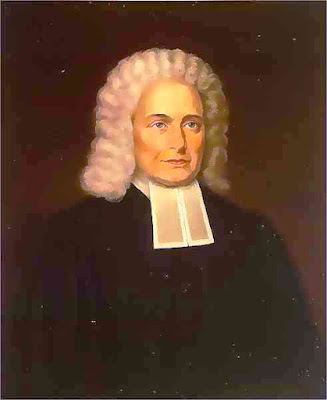By Dewey Roberts - Posted at Vanguard Presbyterian Church:
With this week’s article, I am sending out the gist of a message I gave In Richmond, Virginia last Friday evening on the 300th anniversary of the birth of Samuel Davies. Half of the message is in this week’s email and the other half will be next week. There were about 120 people who gathered last Friday evening at the Virginia Crossing’s Hotel conference room and I was the keynote speaker. I chose to address them on his Samuel Davies was in one sense the most important of the founding fathers of this country. Before my speech, a very astute man commented to me that the American republic began at the Polegreen Presbyterian Church in Hanover county where Samuel Davies preached and where young Patrick Henry listened to the sermons of one he esteemed to be the greatest orator he ever heard. I could not agree more with that sentiment. Yet, Davies is strangely forgotten by modern America. There are many reasons why Davies should be remembered, but I chose to speak about the things he did by way of cultivating a public spirit and serving his whole generation.When I was checking into my room, I saw a lady getting some things out of her SUV and I asked her if she needed help, but she said she had everything. My friends, Ned and Marla Coleman, were helping me get several boxes of my book, Samuel Davies: Apostle to Virginia, into my room. That lady then asked me what the book was and I told her it was about a Colonial minister. She asked: Did he work with George Whitfield? I said he did and then she replied, “I love reading about the Great awakening.” As she was moving towards the elevator, I asked her how she knew about those things and she simply said, “I am the Lieutenant Governor.” Her name is Winsome Sears. A friend had encouraged me to contact her and invite her to the conference (which I did), but her office told me she would be unable to do so because she is in a political campaign. What struck me, though, was that she knew about George Whitfield (who was British), but did not know about Samuel Davies (who was local). It is not her fault, in one sense. Samuel Davies has been forgotten by this country and we need to remember him at this critical juncture of our nation. What follows is the essence of my speech.
Isaiah 32:8 says: “But the noble man devises noble plans and by noble plans he stands.” In many ways, that verse describes Samuel Davies. On November 3, 1723, three hundred years ago today, he was born in New Castle county, Delaware to parents who were both immigrants from Wales. His parents, David and Martha Davies, may have never learned to speak English well and they had to sign with an X when they joined the Pencader Baptist Church in 1717. Samuel himself only had a few years of education—two years at a grammar school in New Jersey; a year or two of education in the Welsh Tract; and, then 4-5 years of education at Samuel Blair’s school for ministers. When we read his letters, his sermons, his tracts, and his various works, we are amazed that a man of such little education could also be a “man of letters”, as he was. We are tempted to ask about him as the Jews once asked about Jesus, “How did this man get such learning having never been taught?’ Only the greatest of men can become so prominent in knowledge without being taught—men such as Samuel Davies, Charles Spurgeon, D. Martyn Lloyd-Jones, and even Jesus Himself.
Yet, Samuel Davies has lived in relative obscurity for the past 150 years and is mostly forgotten even in Hanover, Virginia where he did his greatest works. Why is that? There are at least three reasons. First, he died at a young age. He was barely 37 years old when he died of pneumonia. Second, there was never a full biography written about him by those who knew him best. Robert Murray McCheyne is well-remembered precisely because his friend, Andrew Bonar, worked prodigiously on the Memoir and Remains of R. M. McCheyne. No one took up the task of writing a biography of Davies shortly after his death and thus he was forgotten. Third, the church where he preached every Lord’s Day, Polegreen Presbyterian Church in Hanover, Virginia, was burned to the ground in the Civil War battle of Cold Harbor in 1864. Until that time, many people remembered Davies because his sermons were the mostly popularly read and sold in the English speaking world for nearly a century. But when the Polegreen church burned to the ground, everything was lost and Davies was forgotten. What a shame.
There is a sense in which Davies deserves to be considered one of the greatest of the founding fathers of this nation. He was involved, either directly or indirectly, in all of the greatest issues of this nation in her founding and early history. He was on the right side in every instance. It is no exaggeration to state that the American republic had her birth and foundation at the Polegreen Church and with Samuel Davies. So, I want us to consider the four great crises in which Davies played a leading part either directly or very closely through others.
